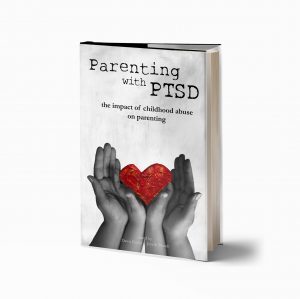
The Survivors Empowering Survivors series features inspiring people who are using their trauma history to help others heal. Today we are proud to feature the work of Laura Parrott Perry of Say It, Survivor.
Tell us a little bit about who you are, and the work that you do
My name is Laura Parrott Perry, and I’m a mother, writer, speaker, and co-founder and CEO of Say It, Survivor, a non-profit dedicated to helping survivors of sexual abuse reclaim their stories as part of the path to healing. In the past I was an art teacher and special-ed paraeducator.
What is one resource (book, website, Ted Talk, other) you frequently recommend?
One? For parents, I recommend The Mama Bear Effect and Parenting with PTSD. For survivors there are many great resources. Our SIS website and facebook page, obviously, but also RAINN and Cis White (healwritenow.com) For books, I recommend anything by Brene Brown and The Body Keeps the Score by Bessel van der Kolk. Not all are specifically about sexual abuse, but they are completely relevant and hugely helpful.
If you could tell a survivor with PTSD one thing, what would it be?
That wherever you are at in your healing right now, it is nothing more than that. It’s where you are right now. I think sometimes when we struggle, when we’re in pain and things don’t seem to be getting better, we do the scary math that “things will always be this way.” That does not need to be true. If you are willing to sit still for the pain, not numb it, and do the work- it can get so much better. It can. Hang on. Both hands.
What is one self care practice that you use to help keep yourself in balance while working with trauma clients?
I have very strong, non-negotiable boundaries. Nearly every day, I get at least one story emailed to me. I only check them at certain times, which are stated in my auto response. I know how vulnerable it feels to send your story out and not hear back right away, so I want people to know if they send it at such and such a time or on the weekend, I will not see it until my “office hours.” I also check in with myself before I take in anyone else’s story to be sure I’m in the right space to do so. If I’m not, I don’t.
How do you define triggers/being triggered?
For me, triggers are usually sensory. Something I see, something I smell. Smells are big for me. When I’m explaining them to someone who doesn’t have PTSD, I encourage them not to think of them as memories, but rather as time travel. Something that sends me back to a place of terror or pain- and it’s as real as the day it actually happened. I’m seldom triggered anymore, but it does still happen.
What is the most common concerns you hear from survivors when they enter therapy?
They’re afraid to be judged. That’s overwhelmingly what I hear. We survivors become convinced our stories are unspeakable, and so the notion of dragging that shame out into the sunlight is terrifying for some people. I always strongly urge anyone entering therapy to be sure their therapist is specifically trained in trauma. Not all therapists are created equal.
What are the most common recovery goals for a survivor/parenting survivor in your experience?
I think most survivors seeking healing simply want to be in charge of their own lives. I say it all the time, whatever story you’re not telling is in charge of your whole life. It’s running the board. I think in order for that not to be the case, we have to show up and do the work. It’s hard. But not harder than having your abuser be the author of your life’s story forever.
How or when do you address parenting with trauma?
We talk a lot about parenting as a survivor in our workshops. Most of our participants are moms. One of the questions we ask is how they think their trauma has affected the manner in which they parent. What we hear most is about fearful parenting, hyper-vigilance, needing to control, etc.
How do you know when you personally are triggered?
I get lightheaded, my hearing changes- gets tinny. People seem far away. I feel queasy.
What act of parenting is most triggering for you?
Allowing my kids the freedom they need to explore the world. When they ask to do something outside my comfort zone, my initial response is a fear response, and my gut reaction is to say no.
How do you act differently towards your child now than you did before you were able to recognize the trigger?
I’ve learned not to answer right away, unless I absolutely have to. I give myself time to process, untangle my fear from the actual risks involved and more often than not my answer changes to a yes.
What is a quote that sums up how you live your life?
“Ring the bells that still can ring, forget your perfect offering, there is a crack in everything, that’s how the light gets in.” Leonard Cohen
To learn more about Laura and Say It, Survivor, visit:
https://www.facebook.com/inotherswordsblog/
https://www.facebook.com/sayitsurvivor/
https://twitter.com/SayItSurvivor
____________________________________________________________________________
Join the Parenting with PTSD newsletter to receive a FREE book on release day!
